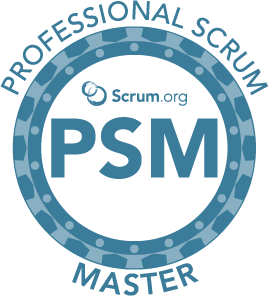Course Objectives
- Students will have a clear understanding of the mechanics of Scrum and their coherence from the empirical foundation of Scrum
- Students can act as a Scrum Master for Scrum Teams and stakeholders based on an in-depth understanding of servant-leadership
- Students can effectively start up Scrum or increase its effectiveness if already underway
Course Topics
The PSM course is a mix of lecture, case studies and interactive exercises as you collaborate with other students:
- Scrum Theory & Principles
- How variables can lead to complexity
- Relating complexity and management styles
- Predictive and empirical approaches to problems
- Exploring the advantages of Agility
- Scrum and the three legs of empiricism
- The Scrum Framework
- What's needed for Scrum?
- Exploring accountability
- Scrum roles, events and artifacts
- Examining the value of time-boxing
- Scrum values and empiricism
- Done and Undone
- Can quality become a habit?
- Technical debt and addressing its effect
- Understanding the importance of Done
- Defining "potentially releasable"
- Impacts of not defining Done
- Product Delivery with Scrum
- Why Plan Product Development with Scrum?
- Techniques for Product Backlog ordering and valuation
- Methods of Product Backlog organization
- Techniques for estimating size of Product Backlog Items
- Planning and forecasting
- Monitoring and reporting progress
- People and Teams
- Great teams
- Intrinsic motivation
- Cross-functionality
- Scrum Values
- Stages of Group Development.
- The Scrum Master
- Experiencing positive leadership
- Choices of servant leaders
- How will you help others improve?
- Responsibilities of a Scrum Master
- Scrum Master skills and traits

 UNH Professional Development & Training has partnered with Scrum On, an officially recognized member of the Scrum.org Professional Training Network, to offer the Professional Scrum Master (PSM) course - the industry leading 2-day course that covers the principles and (empirical) process theory underpinning the Scrum framework, and the role of the Scrum Master in it.
UNH Professional Development & Training has partnered with Scrum On, an officially recognized member of the Scrum.org Professional Training Network, to offer the Professional Scrum Master (PSM) course - the industry leading 2-day course that covers the principles and (empirical) process theory underpinning the Scrum framework, and the role of the Scrum Master in it.